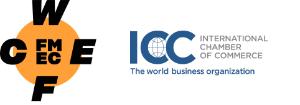Resource productivity and waste
OECD at World Circular Economy Forum 2021 Towards a mutually supportive trade and circular economy agenda

World Circular Economy Forum 2021 - Accelerator session: Towards a Mutually Supportive Trade and Circular Economy Agenda
The Accelerator Session at the World Circular Economy Forum 2021, jointly organized with the International Chamber of Commerce (ICC), brought together 163 participants to discuss what trade barriers exist for private businesses in a circular economy transition (panel A), and how international cooperation can provide solutions to overcome these barriers (panel B).
In the first panel, Mr. Bellmann presented the joint ICC and IIT study on “The International Trading System and the Circular Economy - Recommendations for action in the WTO”, and its preliminary recommendations. Panellists from WTO, WEF, and the private sector welcomed the study and the initiative of the ICC to bring expertise on this topic to a global scale. Panellists agreed that recommendations for action within the WTO would contribute to the development of consistent, global frameworks. Some highlighted that businesses ready to invest in circular economy solutions are likely to benefit from enhanced growth opportunities. Major challenges to the transition include how to ensure a common framework to promote a transition to more circular business models, and how to ensure developing countries’ interests are addressed. More focus on incentives based on trade facilitation rather than market access was welcomed as a way forward to overcome some barriers faced by businesses.
In the second panel, Mr. Yamaguchi presented an overview of existing OECD work related to “Towards a mutually supportive trade and circular economy agenda”. He highlighted that lack of clear definitions, standards, and transparency undermine trust in enabling trade to work for a circular economy, but that trade can and should play a critical role in the transition to a more resource-efficient circular economy. Panellists from WTO, WCO, Basel Secretariat, SITRA, and McArthur Foundation highlighted specific barriers related to the different international dimensions, such as customs and the Basel Amendments. Possible steps forward mentioned by panellists include the development of better data to track and monitor the impact of a circular economy, and better coordination between and among stakeholders.
The session concluded that while there are still many barriers to overcome, there is noticeable progress in including circular economy considerations in the international trade system and that awareness of the issues is much larger than in the past.
Agenda
- Agenda
- Session part A “The international trading system and the circular economy – recommendations for action in the WTO” moderated by Crispin Conroy from the International Chamber of Commerce
- Session part B “International policy coordination to facilitate the transition to a circular economy" moderated by Rob Dellink from the OECD
- Presentation 1: The International Trading system and the Circular Economy, by Christophe Bellman, Visiting Fellow Institute for International Trade
- Presentation 2: Towards a Mutually Supportive Trade and Circular Economy Agenda, by Shunta Yamaguchi, Policy Analyst, OECD Environment Directorate
- Q&A session
Related OECD reports
Engage with us
- Contacts: Rob.Dellink@oecd.org; Norbert.Monti@oecd.org
- Sign up to our OECD Environment ewsletter
- Follow us on Twitter: @OECD_ENV
- Contact us by e-mail: env.contact@oecd.org

